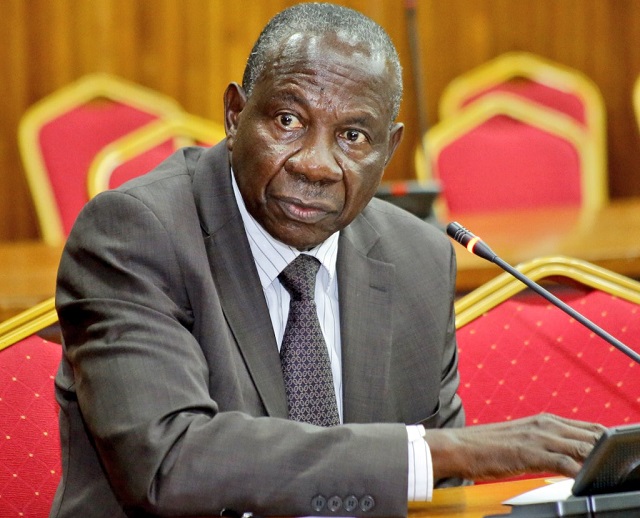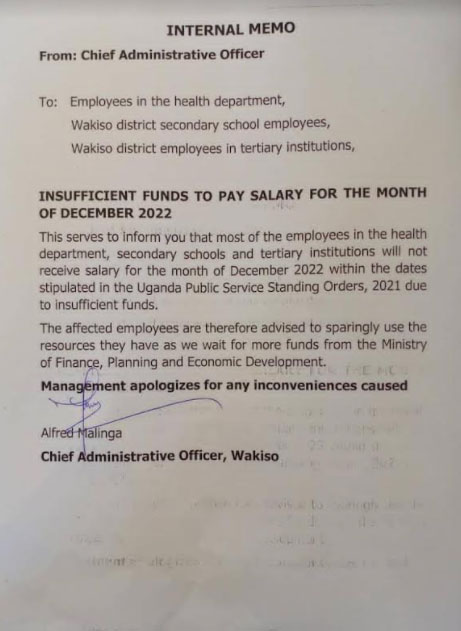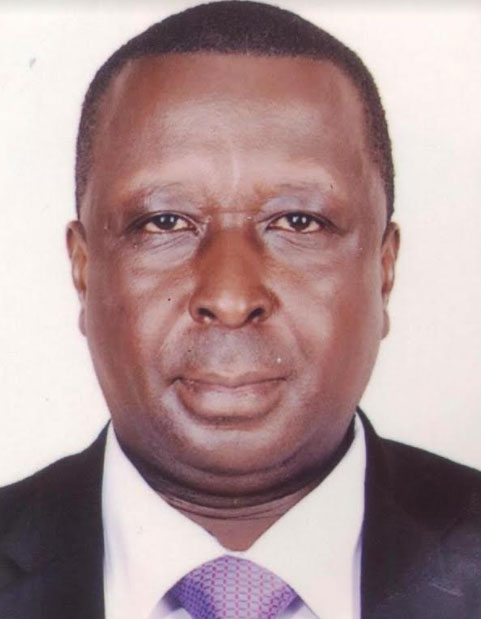
COMMENT | Alfred Geresom Musamali | When finance minister Matia Kasaija admitted in Parliament last week that some governmental offices were facing funding shortages and could not pay before this past Christmas their workers’ salaries, I remembered December 1979 when I lost my mother’s salary. My mother Mrs Eleanor Mwassa of Nabumali Town Council in Mbale, eastern Uganda these days sends her grandchildren with an Automated Teller Machine (ATM) card to pick her retired teacher’s pension from the bank. But the 80 or so year old woman is yet to trust me again with any of her monthly earnings.
Before banks became more ubiquitous, with ATM service centres from which a client could even pick money at midnight, the heads of governmental offices were required to go to their district and national headquarters and collect salaries on behalf of every employee they supervise.
That is how former Bumbobi Primary School headteacher Mrs Robinah Wanda (RIP) went to Mbale monthly to pick my mother’s salary. Bumbobi is about six miles (we still find it it difficult to count distances in kilometres!) along the Mbale-Tororo. It is at the junction where the new (but already potholed!) road branches left into the Elgon mountains as well as to Lwakhakha on the Kenya border. There is a not too steep hill from Bumbobi to Nabumali Town Council, another four miles away towards Lwakhakha. And so you can imagine how an excited nearly 19-year-old man could have flown down the hill to fetch his mother’s salary because everything teenage Christmas also depended on it.
The money fell from my back pocket
In those days there were no National Identity Cards (NICs) and adults (mostly men) identified themselves by the Graduated Tax (GT) tickets. But since I had not yet started paying GT, I did not have any such ticket. In lieu of the GT ticket, I would have used a school identity card but I had been out of school for one year so it was probably either expired or even lost.
Mrs Wanda, who had never seen me before, however, identified me by my dark face, thin nose and small eyes resemblance to my mother. I doubt whether I even signed anywhere before she handed over the money – nine hundred shillings (UGX900) in bank notes newly printed by order of then President Godfrey Binaisa’s finance guru Jack Ssentongo. Marshal Idi Amin, VC, DSO, MC, etecetera had fallen eight months earlier and the dirty old notes embossed with his head had been replaced. Maybe it was even President Yusuf Kironde Lule and his team who placed the order but the poor professor’s fell within 66 days and the currency arrived from famous printers de la rue in time for bulky-headed Binaisa to claim credit for it. A kilo of meat was thirty shillings (UGX30) at that time so you can work out that the salary could buy two goats of 15 kilogrammes each.
I put the money in my hind pocket, rode up the hill like any energetic fellow could then when I reached Masikye Growers Cooperative Society, at Nangwasi on the crest of the hill, I felt a lightness in my pocket. The money had slipped out of the pocket! I got confused, this time pushed the bike down the hill, looking into every possible piece of dust and seeing nothing.
At a malwa (millet beer) place owned by my former Nyondo Boys Demonstration School P4 classmate called Mawelo (RIP), I encountered two men counting through what appeared to be exactly the same bank notes, arranged in the same way. They were planning to go to Mbale and buy bottled beer to trade in during the festivities, as Mawelo’s clients were bound to need some change from malwa. I explained to them my predicament and they dismissed it as none of their business. I went back to Mrs Wanda, foolishly pleading to be given more money otherwise my mother was just going to skin me alive. The poor headteacher was very sympathetic with me but told me that as a fellow who had completed Ordinary (O) Level secondary education (and even sat at home one year because I had not been admitted to the next academic or vocational level) I ought to know that that was not how public finance matters were managed.
I do not remember how I eventually faced both my parents, as my father (also a teacher) was equally an interested party in that salary. But I know that I have lived with that guilt forever. In the new year, I got a job as a licensed (temporary) teacher at Namawanga Primary School and, technically, I have never been back home since. I go there, for two or three minutes, drop a package or two for the parents, then disappear in pursuit of other things. Even when I was a teacher in Nabumali High School half a mile from their home between 1991 and 1993, my parents often just bumped into me by accident. I had worked my way up the academic ladder, mostly through bursaries, scholarships and teaching temporarily so I found little reason to request any money from the parents. They are very religious, forgiving folks, I can assure you, and they have probably even forgotten about the loss. However, the public servants who missed salary this past Christmas will require a lot more religion than my parents to forgive whichever government official has caused misery for their families.
Some public servants have gone three or more months without salary
Wakiso District Chief Administrative Officer (CAO) Alfred Malanga publicly raised an outcry about funding shortages.
“This serves to inform you that most of the employees in the health departments, secondary schools and tertiary institutions will not receive salary for the month of December 2022 within the dates stipulated in the Uganda Public Service Standing Orders, 2021 due to insufficient funds,” said Malanga, is an undated internal memo.
“The affected employees are, therefore, requested to sparingly use the resources they have as we wait for more funds from the ministry,” he added.
Cases of possible salary delays were also reported in Nakaseke, Kayunga, Bududa, Manafwa, Bulambuli, Nakapiripirit, Kween and Yumbe districts during this quarter.
The standing orders require that salaries be paid by the 28th day of every month through the individual bank accounts. “Salaries shall be paid correctly, promptly and as a lumpsum in accordance with the approved salary structure for Public Service,” say the Standing Orders.
“The responsible officer shall that the public officer accesses the payroll within four (4) weeks of the date of assumption of duty,” the orders add.
Sources at the Ministry of Local Government (MoLG) which supervises the districts, however, also said new employees who had been hired to run the secretariat for the Parish Development Model (PDM) have not been paid any salary since they reported for work in mid-October. The PDM is the policy framework under which the poorest members of the grassroot communities are empowered with startup capital through Savings and Credit Cooperative Societies (SACCOS) to establish enterprises of their own choice. The PDM secretariat is charged with the responsibility of monitoring the performance of the SACCOS to ensure that the funds are used sustainably in order to reduce poverty.
“Now if the chaps who are supposed to monitor performance of the programme to ensure sustainability are themselves broke, how do you expect corruption not to creep in?” asked the source, laughingly.

Dunstan Balaba, the chairperson of the Association of CAOs said yesterday (Thursday, 29th) that the finance ministry had advised governmental entities that were facing shortage of funds to do a viament from the payrolls of other categories where there could be balances. A viament is when funds are transferred from one category under a vote to another category under the say vote.
Sources familiar with public finance management, however, pointed out that government releases funds to votes in quarters (three months) and that this is the last month of the second quarter. They said there is very little likelihood of any vote having balances under any category unless there was over-budgeting under that category. They said the other possibility could be that some employees under that category have missed their salaries for some months or they are under sanctions for some offenses and are only receiving half-salary as investigations go on or are confirmed dead but their salaries have continued being releases from the finance ministry or there are outright ghost employees.
Reacting to reports of possible delays, finance mininster Matia Kasaija blamed the situation on poor planning and budgeting by affected agencies and local governments. Finance permanent secretary Ramathan Ggoobi said the reports of delays had thrown many civil servants into panic as Christmas nears, a time when they are expected to spend on merry making with their families.
During the Christmas and New Year holidays, some urban dwellers travel to their ancestral villages for family meetings, baptisms, marriages and, among some ethnic groups in even years, circumcisions. Not all functions are merry making, though. The families, for instance, gather to hold funeral rites for their loved ones they may have hurriedly buried earlier in the year due to pressure of work. They also go there to prepare their retirement pads so that at the end of their working life, they have a quiet place to which to peacefully and confidently withdraw.
“Failure to travel to the ancestral villages during such opportune times renders workers culturally disjointed. Yet travel and stay in the villages for one or two weeks is very expensive and requires that December salary,” said James Wanyonyi, a Kampala public servant.
“Besides, January is a very challenging month which requires enough money to have been set aside to cater for feeding children on holidays till the January salary arrives. Now imagine if an employee is not even guaranteed that the payroll mistakes will be solved in time for payment of January salary,” he added.
Ggoobi was earlier quoted to have said, “What I do not want to hear is that Ugandans served their country but can’t be paid because someone claims there is no money. I cannot let that happen under my watch”.
Nevertheless, it happened again this Christmas, complete with the same volongoto explanations as I gave Mrs Wanda and my mother over the missing salary.
Banks and other lenders do not understand such public finance management nonsense
Public servants find it difficult to raise money for construction of decent homes through savings. Neither can they afford to pay fees for their dependents out of savings. Instead, they seek loans from banks, SACCOS and outright money sharks/shylocks. Those lenders charge high interest rates, demand collateral and expect prompt repayment. It is not unheard of for the money lenders to move in and auction cheaply public servants’ collaterals if the borrowers delay repayment for even just one month. And come next month, we could expect the teachers to be among the biggest culprits. So, I really find it difficult to wish these public servants a Happy New Year. Instead, let me wish them another Year of Grim Perseverance like my mother persevered in 1980.
*******

The author is Founding Director of Vicnam International Communications Ltd, a private firm of communications, public relations and information management consultants. He specialises in the Proofreading and General Editing (PAGE) of documents and can be contacted by Tel: (+256)752-649519 and by Email: agmusamali@hotmail.com.
 The Independent Uganda: You get the Truth we Pay the Price
The Independent Uganda: You get the Truth we Pay the Price





